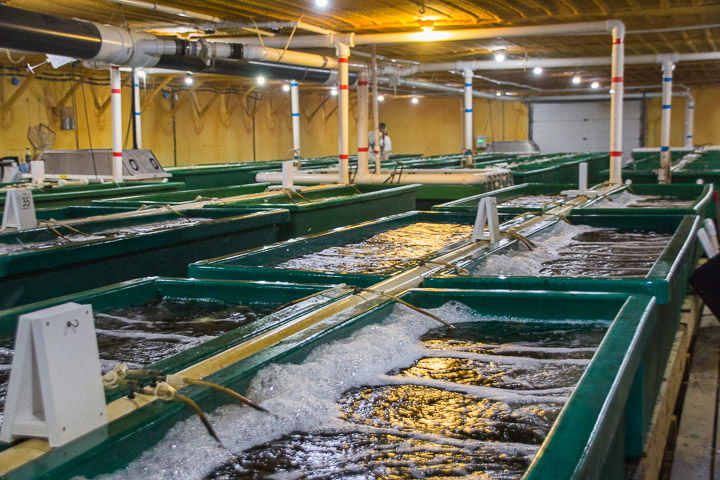No. 4: Recirculating Aquaculture Systems (RAS)

Land is probably not the first thing that comes to mind when you think about fish. However, moving this historically aquatic food production system inland has significant potential to reduce negative environmental impacts to coastal environments. These highly sustainable systems, referred to as Recirculating Aquaculture Systems (RAS), contribute to a decrease in marine habitat destruction, lower freshwater consumption, and reduced ocean pollution. Most of today’s RAS based farms recycle nearly 100% of water used while filtering out effluent, excess feed, and excess nutrients related to eutrophication and acidification (think phosphorus and nitrogen). Not only does this indoor sustainable practice mitigate environmental impacts, but it opens up opportunity beyond purely coastal states for farms to be located all across the country – including even urban environments! Seafood Watch has given all RAS systems in the US the highest sustainability rating. Aquaculture scientist at Seafood Watch, Tyler Isaac notes, “Right now, [we] recommend all farmed fish from RAS as a ‘Best Choice,’ since these systems generally score well on many of our metrics like effluent and disease.” For a long term and stable future of aquaculture RAS is an unavoidable and imperative production method for fish farming.
Our top three examples are:
1) VeroBlue farms: owned by the Nelson family proves RAS farming is responsible and is successful way inland, all the way out in Webster City, Iowa. Once hog farmers, VeroBlue supplies barramundi all across the country. Compared to their hogs requiring 4 pounds of grain and 600 gallons of water per pound of protein, barramundi need only 1 pound of grain and less than 7 gallons of water per pound (read more about the different requirements of meat and fish here). The Nelson family then uses the fish wastewater as fertilizer and irrigation for their crop farm.
2) An Indiana and Massachusetts company, AquaBounty has proved even salmon can be raised on land. “Seafood is a healthy protein, and the self-sufficient design of land-based RAS farms is a tremendous opportunity. And I think the time for that is now,” says CEO Sylvia Wolf. With success, the company plans to expand to the midwest.
3) In the very industrialized Brooklyn, NY, Upward Farms uses vertical fish farming to produce striped bass and grow micro greens (hello polyculture!) from their wastewater. With careful monitoring and no need for antibiotics, the benefits of this system are huge."